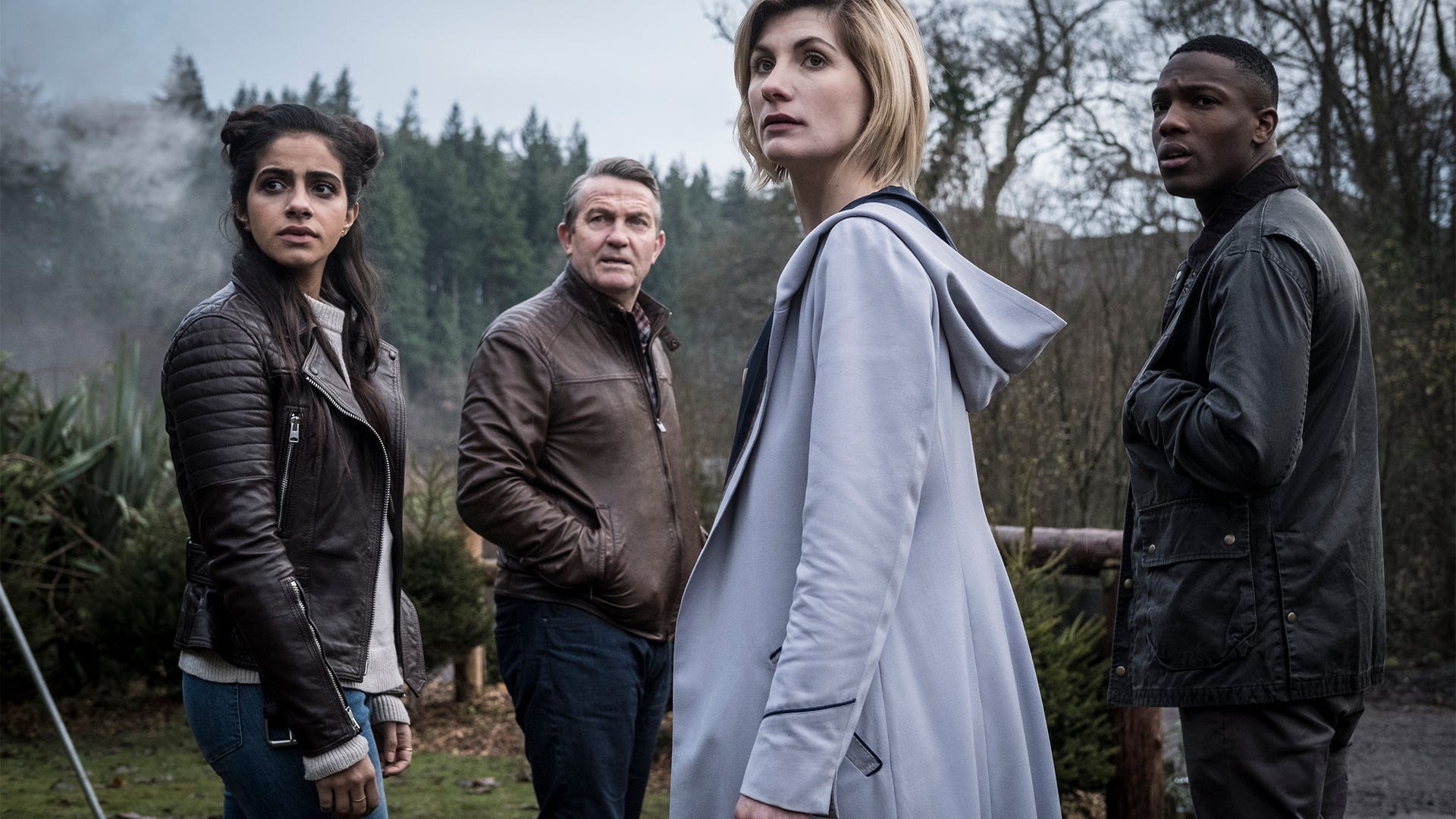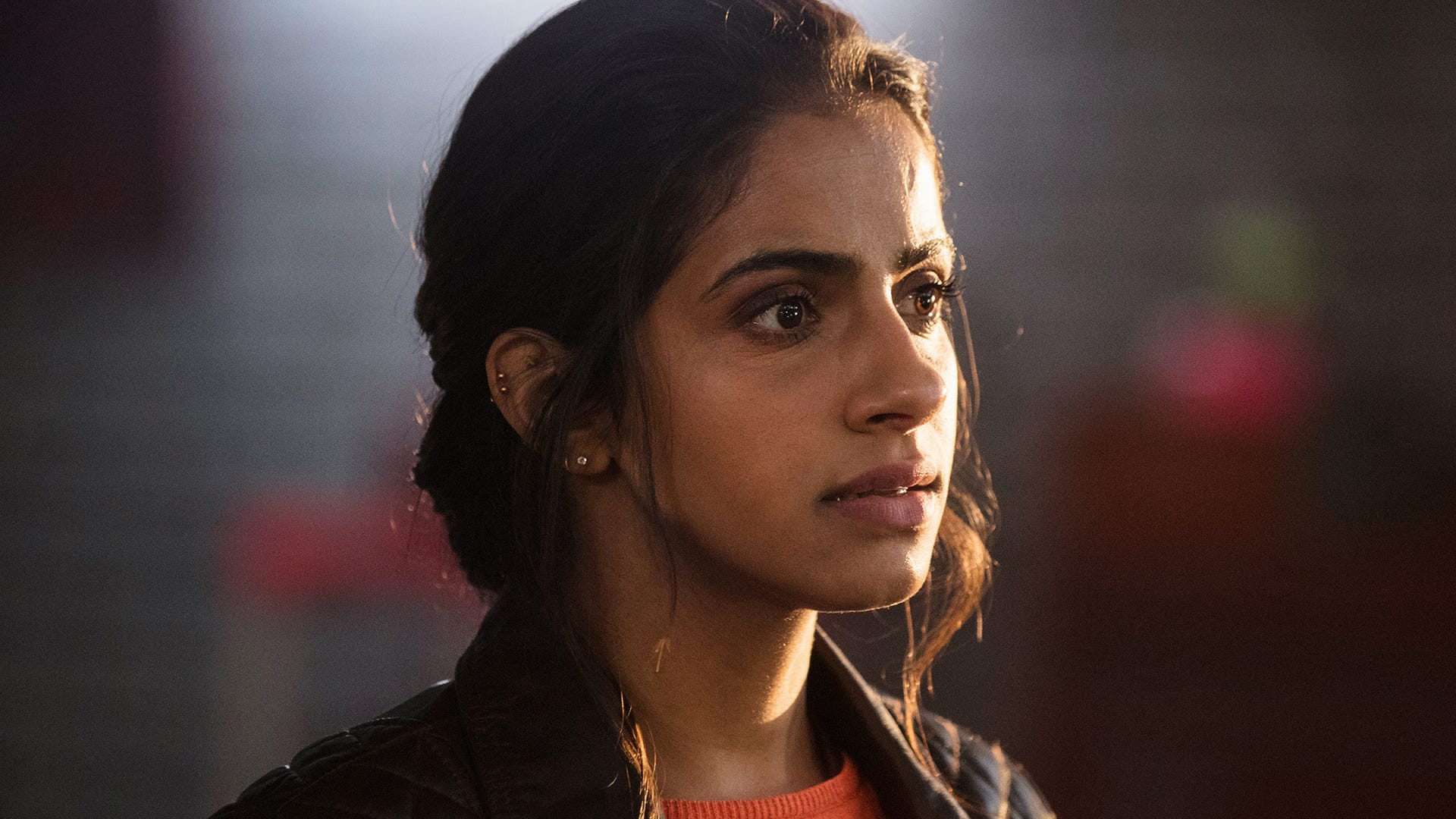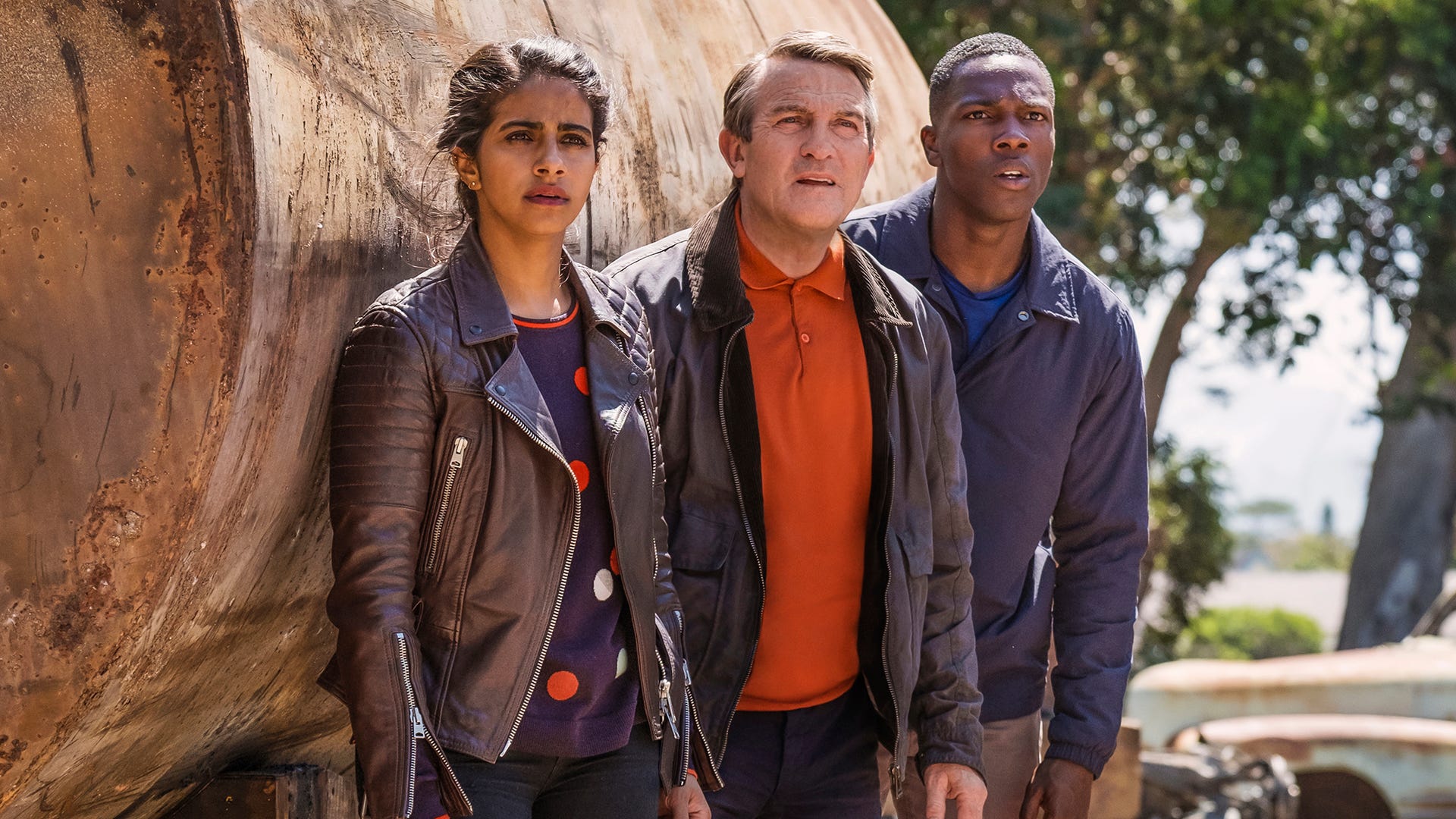Join or Sign In
Sign in to customize your TV listings
By joining TV Guide, you agree to our Terms of Use and acknowledge the data practices in our Privacy Policy.
Mandip Gill's Wibbly-Wobbly, Timey-Wimey Journey to Doctor Who
The new companion opens up about how the show's dynamic is changing in the new era
Mandip Gill, one of the actors playing one of three new companions on the latest iteration of Doctor Who, bashfully admits to me that she wouldn't have called herself a fan of the show before she was cast.
"I completely knew what it was, it's very big in England," she understates with a laugh. "My entire family watch it and I've had friends that were guest leads so, I've tuned into that. But I'm not gonna say I was a fan cause I think the real fans then would be angry."
Though her prior knowledge wouldn't be considered encyclopedic in any way, the 30-year-old actress most famous for her role as Phoebe in Hollyoaks knew that she couldn't pass up the opportunity to audition for Doctor Who when it came across her path. With the first ever female Doctor, played by Jodie Whittaker, in the works, Gill had the shot of a lifetime in front of her as Yasmin Khan, a 19-year-old police officer in training. Yas, as she's affectionately known on the show, is bored and ambitious. She knows she has more to offer than breaking up parking disputes between heated housewives; she's just waiting for a shot to show what she really has to offer. When it comes, it happens not via the badge, but a recently regenerated Time Lord crashing through the roof of a train to Sheffield.
Discover your new favorite show: Watch This Now!
Gill and Yas are about to step up to the plate in a big way as Doctor Who enters a game-changing era. As Gill embarks on an adventure that will make her an international (at least on Tumblr) name, TV Guide caught up with her to talk about casting, meaningful representation, and how the show's dynamic has changed by writing in three companions instead of one.

Can I ask a little bit about your casting process? Doctor Who has always been known for discovering new talent but the show is also going through a period of time where the basics fans thought they knew -- like the fact that the Doctor is traditionally a man -- are being shaken up. I'm curious whether they were looking specifically for a South Asian woman, or whether that role was re-written for you when they found you.
Mandip Gill: No, I went through a process just like I would any other job in which my agent received the breakdown for Doctor Who and I went for my audition. In the original audition, it said you can bring as much to the character, we're looking for what the actor can bring. It was all written in the text, though. [New showrunner Chris Chibnall] had written a beautiful scene which made it to the episode which is the train scene. So there was a lot in the scene that we were given. There wasn't too much for me to have to create, but there was an emphasis on seeing what the actress can bring to the role and whatnot. But, no. It definitely, the role was already there. I auditioned for the role as opposed to it being written for me.
So it wasn't colorblind casting? In the sides that you got for the audition, was the character's name already Yasmin Khan?
Gill: She was called something else which changed quite a few times. I knew she was a police officer obviously, it said PC, and then she had a different surname, but still of Asian [descent]. As far as I know, Chris was always looking for an Asian woman, so the breakdown did say Asian woman.
That's really nice to see specifics on casting calls. Often in Hollywood when it's an open casting call it's just a workaround to say the showrunners and network tried to find diverse casting later on, but it's heartening to hear that Chris went for it.
Gill: Very specific, yeah. But sometimes it works in our [actors from minority communities] favor when we go for a non-race specific part, because you normally just booked for Asian parts and you're not seen for somebody that is called Lauren. You don't look like a Lauren 'cause you're brown, so you're not going to be it. Whereas when it is non-race specific, it means that opened our agent to send me, because there is no name attached and no race, but I can be that person and then it's there for the best actress or the most suitable actress. You get that part.
But in this instance, it is very interesting, the fact that Chris specifically wanted an Asian woman in the series, it's up here. That is very telling, because when you look at his other work, like Broadchurch and whatnot it is very diverse.

Mandip Gill, Doctor Who
BBC AMERICADefinitely. And you know, speaking of Yas and Chris specifically looking for this kind of character, Yas is very different to most Desi women I'm used to watching on screen. Obviously, you and I have our background of Bollywood tropes and know what that looks like, but even amongst the diaspora representations, Yas is different. She's tough but she's not mean. She's a woman of action but she's not violent, she's just steady and smart and ambitious.
Gill: YES! You know what, Chris is just a very good writer. When he writes, the words and the characters end up his. He just looks around and says, "I want an Asian type but how do I make her real, and reflective, and 3-D, and truthful."
And I think that's what we mean when we say are we only seeing an Asian character as x, y, and z. That's really just the writer doing a two-dimensional character. Whereas here, Chris has written something 3-D and you know, I hadn't had any input in the character back then, but I knew that when I went in to create this character I didn't want her just to be a basic police officer who isn't scared of anything, 'cause that wouldn't be that interesting when she's not scared of this monster. Cause that's not interesting to watch and it's also not very truthful.
So you said that you hadn't really changed much of the character that Chris gave you on the page, but how has that collaborative process proceeded? Were you involved at all in shaping -- not her story arc -- but her emotional arch? Or in terms of bringing details of your own life to get at the specificity of the character?
Gill: Not so much, because it had already been pre-written before I got there. The writers have been working on the series since 2015 and some of them are of Asian descent so the storyline that we go on to do and just generally things about Yas is really truthful, because they're written from people with the same background as I have. So, there was not that much input in that sense, but on a daily basis on the floor when I'm reading the script, I can then put my emotional input anywhere and [shape] Yas's reaction.
You know most directors -- not all of them -- have just let us get on with that in that sense because you know your character better than they do. 'Cause they haven't directed every episode, so they drop in and go, "Oh no I don't think that Yas would be upset at this, I think she would be able to handle it and whatnot."
That's where I can say, "Actually, I think even if she is a police officer and she may have been scared, it still would affect her, because at the end of the day she's a human being and it's a situation outside of work and whatnot." That's [really where we have] input.
Did you go back and watch the series to find inspiration from any of the past iterations of the show while crafting your character?
Gill: When I got the audition, natural instinct was just to start watching the show, because I didn't know if it was gonna be new, if it was gonna be different, so naturally I wanted to know the style of what was going into it. But, when we got through the audition process, there was just a huge emphasis on owning the truth of the character and there was no [obligation] to watch what had happened before.
[Any new iteration of] the series is an access point for the people but they don't forget about the fans from before. But I didn't go, "Oh right, now I think I want my character to be like x, y, and z." But because I also didn't know what was going to be written, and there's only so much you can prep when you don't know what's being written.
A lot of the stuff, to me personally, I find out of the text on what's being put on the page and that helps me create a character. I did like Karen Gillen's character, I thought that she was fun but mysterious and interesting to watch. So I knew, If anything, I wanted to create a character that was very dimensional, you know that wasn't just a human who didn't like the adventures, but there is only so much you can do when you haven't read the script. There was nothing that I could say, "Oh, I'll do it in this style." Because then when we got to the floor, we were all doing something completely different.

Mandip Gill, Bradley Walsh and Tosin Cole, Doctor Who
Coco Van Oppens, Copyright BBC Studios 2018When I first watched the premiere, Yas reminded me of Amara Karan's character in the Doctor Who episode "The God Complex." Not so much in personality, but in the steadiness both of them possess. And then I remembered when "The God Complex" came out, the fandom loved her and kept saying she should have been a companion. Yas is similar in the sense that she will run toward danger at any point but she knows how to keep a cool head in that situation which isn't necessarily the Doctor's strong suit.
Gill: I've not watched that episode! That's very interesting that you say that, it actually hits the nail on the head. Yasmin runs into things, but it's because of her job outside of these situations that she runs in. There is always that moment where she kind of stops and still needs the Doctor which I quite like, because well, how do you know how to handle a monster? She's not scared of going after them, but I like the fact that she is always very aware. The Doctor definitely knows more than her, and so she'll definitely go in front in every instance.
One of the great things about this season that I'm really enjoying is the fact that the companion doesn't have to be all things for all people, cause there's three of them. How has that changed the dynamic of the show?
Gill: Like you said, Yas doesn't have to now be everything, she doesn't have to understand everything and figure it out and then be funnier than x, y, and z. You've got all the other people doing that. What changes is that it just gives an entry point to different people. A point to jump in and relate to a certain character, so someone might relate to my character more than they do the other two. So, now if you're like, "You know what, I just didn't like the companion," you've got two other places to get in at.
Our characters are completely different -- the way Graham (Bradley Walsh) or Ryan (Tosin Cole) responds to something is absolutely not the way Yas would. You see more and more throughout the series that their responsibilities are completely different. There is always a different energy bouncing around, you've got one person not wanting to do it, one person really not wanting to do it, one person that thinks they can do it, and then you've still got the Doctor.
It's never weird. Even if one of the companionships goes off with the Doctor, you'll find that often they send up on their own little mission, and because the doctor knows everyone's strengths and weaknesses and sends them off on their own little missions that'll be whole scenes without the Doctor or whole scenes with the companions gone off to do something else.
That's so lovely to hear, because honestly one of the best lines in the premiere is when Thirteen says, "Gather up troops." And then she immediately corrects herself to say team and I thought that was just such a lovely indication of what Thirteen and this iteration of Doctor Who is going to be. It's very clear that she is learning from her past seasons and is like, "Oh, these aren't people that I have to protect, these are people that will help me be better." How do you think these four really strengthen each other, really build towards a team?
Gill: We all lend ourselves to the Doctor in completely different ways. Like sometimes someone needs an emotional support, and you know it's always just one of those the Doctor would have had to provide all of that for the companions. Whereas [in our season], you have Graham as that support. Ryan or my character, you know they just lend themselves to each other and at the end of the day they're like a family so they go back after their adventures and just feel like a family. And, like you said, when she says our team -- it's a proper ensemble piece and I think that's what Chris wanted and has managed to achieve. Throughout the whole series, it's a proper ensemble piece. I read pages today that weren't just the Doctor, and the team weren't happy to do everything [she asked], but she just said to us like you go off and do that, no you're good at that you go off and do that. [In this series] the Doctor is still telling us what to do, but more than ever, she still needs our help.
This interview has been edited and condensed for clarity.
Doctor Who airs Sundays at 8/7c on BBC America.
